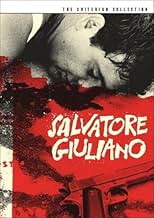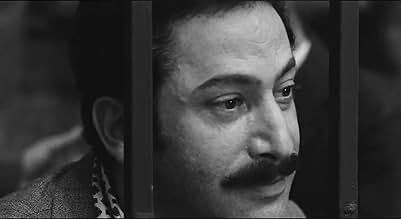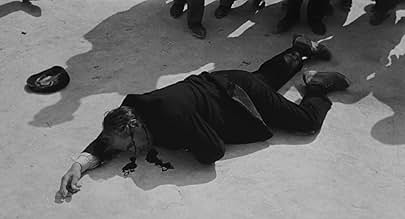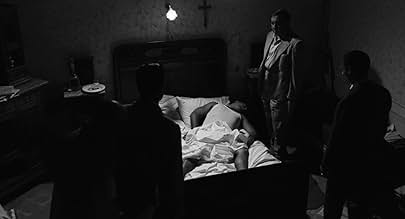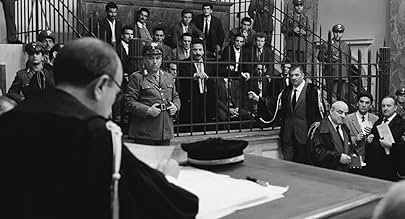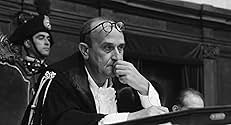IMDb-BEWERTUNG
7,3/10
5221
IHRE BEWERTUNG
Die undurchsichtigen und komplizierten Wendungen zwischen der Staatsgewalt, der Unabhängigkeitspartei und der Mafia im Sizilien der 40er-Jahre gipfelt im Tod von Salvatore Giuliano.Die undurchsichtigen und komplizierten Wendungen zwischen der Staatsgewalt, der Unabhängigkeitspartei und der Mafia im Sizilien der 40er-Jahre gipfelt im Tod von Salvatore Giuliano.Die undurchsichtigen und komplizierten Wendungen zwischen der Staatsgewalt, der Unabhängigkeitspartei und der Mafia im Sizilien der 40er-Jahre gipfelt im Tod von Salvatore Giuliano.
- Auszeichnungen
- 6 Gewinne & 4 Nominierungen insgesamt
Frederico Zardi
- Pisciotta's Defense Counsel
- (Nicht genannt)
Pippo Agusta
- Minor Role
- (Nicht genannt)
Sennuccio Benelli
- Reporter
- (Nicht genannt)
Giuseppe Calandra
- Minor Official
- (Nicht genannt)
Pietro Cammarata
- Salvatore Giuliano
- (Nicht genannt)
Max Cartier
- Francesco
- (Nicht genannt)
Nando Cicero
- Bandit
- (Nicht genannt)
Pietro Franzone
- Seperatist
- (Nicht genannt)
Giovanni Gallina
- Bit Part
- (Nicht genannt)
Vincenzo Norvese
- Bit Part
- (Nicht genannt)
Carmelo Oliviero
- Don Nitto Minasola
- (Nicht genannt)
Renato Pinciroli
- Pinciroli
- (Nicht genannt)
Francesco Rosi
- Narrator
- (Synchronisation)
- (Nicht genannt)
Giuseppe Teti
- Priest of Montelepre
- (Nicht genannt)
Cosimo Torino
- Frank Mannino
- (Nicht genannt)
Empfohlene Bewertungen
Interesting neo-realistic, quasi-documentary film with notable editing. But did the film deserve the Best Director award at Berlin over Bergman's "Through a glass darkly"? The Swedish film was superior. Martin Scorsese likes it because he can identify with the Italian politics and sociology of that time. The Rosi film is good but overrated.
Through the first hour of this film there are no focused characters, at most a character is seen in two or three short scenes. It's basically just following history and showing examples of it. Luckily it's not rushed, it's decently paced and it is realistic.
The best way to describe this is to call it a docu-drama. A narrator tells you something and then some people either do what's described or continues where the narrator leaves off. Though this approach can work, I did find it distancing in this film and it did make me less interested. The above competent direction and photography did elevate it however and for a long time I felt that it was great.
The films main problem is that we never really get to know anything, least of all about the title character who is despite the entire film being about his history only seen dead, or walking/running around. He only has a few lines.
Then towards the middle we experience two horrendous acts of overacting which damages the film severely. Both involving screaming/crying, the worst offender was the woman playing Giulianos mother. She screams and cries so awfully and in such a high tone that you wonder if you are watching a cheap parody. This scene is agonizingly long.
We do however learn a lot about the conflict going on and after a bit more than an hour, perhaps closer to 90 mins we get one character to follow. Overall I just don't think the film put us inside the conflict and despite giving us historical facts and let us understand the events we never got to the core. This made it cold and somewhat uninteresting for time to time. Not a film I would recommend but definitely a more or less good film.
6.5/10
The best way to describe this is to call it a docu-drama. A narrator tells you something and then some people either do what's described or continues where the narrator leaves off. Though this approach can work, I did find it distancing in this film and it did make me less interested. The above competent direction and photography did elevate it however and for a long time I felt that it was great.
The films main problem is that we never really get to know anything, least of all about the title character who is despite the entire film being about his history only seen dead, or walking/running around. He only has a few lines.
Then towards the middle we experience two horrendous acts of overacting which damages the film severely. Both involving screaming/crying, the worst offender was the woman playing Giulianos mother. She screams and cries so awfully and in such a high tone that you wonder if you are watching a cheap parody. This scene is agonizingly long.
We do however learn a lot about the conflict going on and after a bit more than an hour, perhaps closer to 90 mins we get one character to follow. Overall I just don't think the film put us inside the conflict and despite giving us historical facts and let us understand the events we never got to the core. This made it cold and somewhat uninteresting for time to time. Not a film I would recommend but definitely a more or less good film.
6.5/10
Review of Salvatore Giuliano (1962)
Directed by Francesco Rosi, Salvatore Giuliano (1962) is a gripping, politically charged Italian film that blends the genres of crime drama and historical reconstruction. The film portrays the life and death of Salvatore Giuliano, a real-life Sicilian bandit who became a legendary figure in post-war Italy. Giuliano's story is tragic, marked by his transformation from a rebellious hero to a notorious outlaw and his eventual murder under mysterious circumstances.
Rosi's approach to the material is unique. The film doesn't rely on a traditional narrative structure but instead unfolds in a fragmented, almost documentary-like fashion, presenting the story from various perspectives. This method of storytelling creates a sense of disorientation, mirroring the confusion and corruption of the political and social forces at play in post-WWII Sicily. By juxtaposing the personal tragedy of Giuliano with the larger political landscape of Italy, the film reveals the complex intersections between crime, politics, and the Sicilian mafia.
The performances are strong, with a particularly noteworthy portrayal of Giuliano by Marcello Mastroianni, whose quiet intensity brings depth to a character that is both a symbol of resistance and a product of the violent environment in which he lives. Rosi's direction maintains a cold, observational tone, which works well to emphasize the film's themes of disillusionment and betrayal.
Visually, the film is stunning, with cinematography that captures the stark beauty of the Sicilian landscape while also reflecting the harsh realities of life for the people caught in the web of organized crime and political corruption. The stark black-and-white visuals, coupled with the atmospheric score by Francesco De Masi, enhance the film's somber and tense mood.
Salvatore Giuliano is an excellent example of the political cinema that emerged in Italy during the post-neorealist era. It's not just a crime story; it's an exploration of the corruption and disillusionment that permeated Italian society during the 1940s and '50s. While the film might feel slow or fragmented at times, its depth and ambition make it a fascinating and insightful watch for those interested in the intersection of politics, history, and cinema.
Rating: 4/5 - A thought-provoking, well-crafted historical drama that shines a light on the murky intersection of crime and politics in post-war Sicily.
Directed by Francesco Rosi, Salvatore Giuliano (1962) is a gripping, politically charged Italian film that blends the genres of crime drama and historical reconstruction. The film portrays the life and death of Salvatore Giuliano, a real-life Sicilian bandit who became a legendary figure in post-war Italy. Giuliano's story is tragic, marked by his transformation from a rebellious hero to a notorious outlaw and his eventual murder under mysterious circumstances.
Rosi's approach to the material is unique. The film doesn't rely on a traditional narrative structure but instead unfolds in a fragmented, almost documentary-like fashion, presenting the story from various perspectives. This method of storytelling creates a sense of disorientation, mirroring the confusion and corruption of the political and social forces at play in post-WWII Sicily. By juxtaposing the personal tragedy of Giuliano with the larger political landscape of Italy, the film reveals the complex intersections between crime, politics, and the Sicilian mafia.
The performances are strong, with a particularly noteworthy portrayal of Giuliano by Marcello Mastroianni, whose quiet intensity brings depth to a character that is both a symbol of resistance and a product of the violent environment in which he lives. Rosi's direction maintains a cold, observational tone, which works well to emphasize the film's themes of disillusionment and betrayal.
Visually, the film is stunning, with cinematography that captures the stark beauty of the Sicilian landscape while also reflecting the harsh realities of life for the people caught in the web of organized crime and political corruption. The stark black-and-white visuals, coupled with the atmospheric score by Francesco De Masi, enhance the film's somber and tense mood.
Salvatore Giuliano is an excellent example of the political cinema that emerged in Italy during the post-neorealist era. It's not just a crime story; it's an exploration of the corruption and disillusionment that permeated Italian society during the 1940s and '50s. While the film might feel slow or fragmented at times, its depth and ambition make it a fascinating and insightful watch for those interested in the intersection of politics, history, and cinema.
Rating: 4/5 - A thought-provoking, well-crafted historical drama that shines a light on the murky intersection of crime and politics in post-war Sicily.
"Salvatore.." is more a documentary than a film, in which the story of the legendary sicilian gangster is told. Oddly enough, we never get to see his face, and no insight is given of his character or about how and why did he turn into such an icon for the sicilian people. We only know about him through the other characters in the film. Even though there is some fine acting going on, the direction of Mr.Rosi is downright awful. We are presented with a series of events with no connecting thread whatsoever, other than a logical chronological development. While dealing with an interesting historical moment of Sicily, the film is terribly boring and you need a truckload of patience to stay tuned through the end. If you are keen on studying Sicily's historical heritage, you may find this film interesting, if not, then you should miss it!.
A perfect analysis of the most famous gangster, loved from the poor people, of Sicily. Is very good the acting of Frank Wolff as the cousin of Giuliano, Salvatore Pisciotta. On this Film there is the same history of the gangster of the Film "Il Siciliano" with C. Lambert, but here the film is history, there the film is a bad novel.
Wusstest du schon
- WissenswertesMartin Scorsese credits this film as being one of his many inspirational sources for the look and style of his Taxi Driver (1976).
- PatzerWhen his mother comes to view and identify his corpse, Salvatore's stomach clearly moves as the actor struggles to control his breathing.
- VerbindungenEdited into Il sasso in bocca (1970)
Top-Auswahl
Melde dich zum Bewerten an und greife auf die Watchlist für personalisierte Empfehlungen zu.
- How long is Salvatore Giuliano?Powered by Alexa
Details
- Erscheinungsdatum
- Herkunftsland
- Sprache
- Auch bekannt als
- Salvatore Giuliano
- Drehorte
- 98 Via Serafino Mannone, Castelvetrano, Trapani, Sicily, Italien(Giuliano's body)
- Produktionsfirmen
- Weitere beteiligte Unternehmen bei IMDbPro anzeigen
- Laufzeit2 Stunden 3 Minuten
- Farbe
- Sound-Mix
- Seitenverhältnis
- 1.85 : 1
Zu dieser Seite beitragen
Bearbeitung vorschlagen oder fehlenden Inhalt hinzufügen

Oberste Lücke
By what name was Wer erschoß Salvatore G.? (1962) officially released in Canada in English?
Antwort
